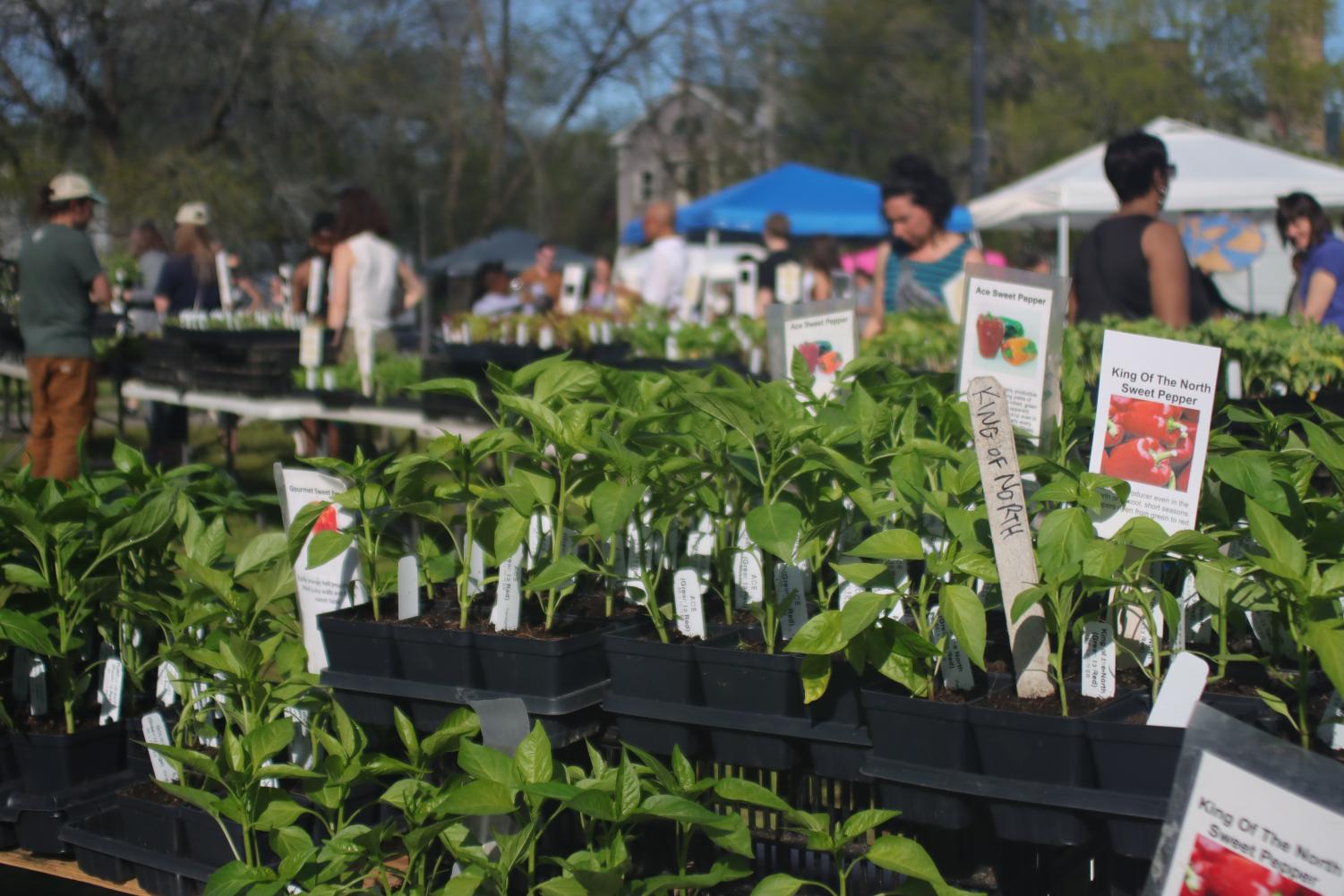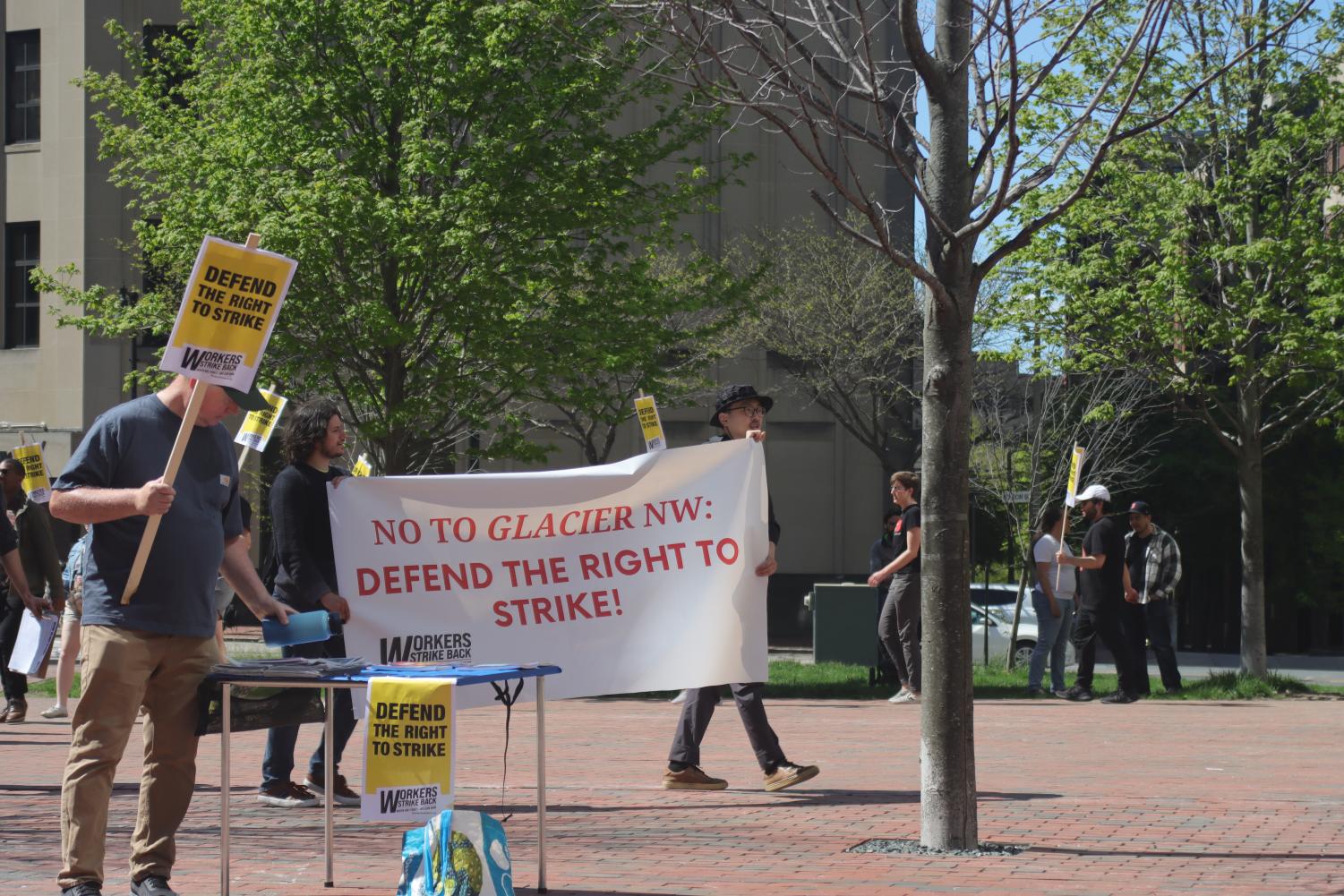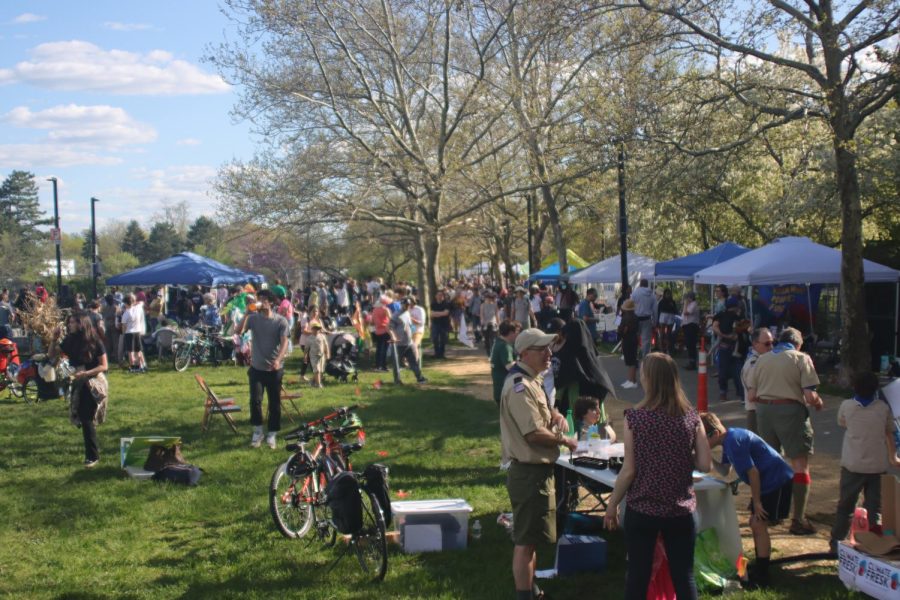Busy weekend in Boston: two protests and a festival in one day
Community members gather in the park for the 2023 Wake Up the Earth festival. This tradition was created in 1979 to commemorate successful activism against a highway being built through Jamaica Plain.
May 19, 2023
Two protests and a community festival took place May 6, marking the height of a busy Boston weekend to promote environmental veganism, labor rights and the celebration of spring and local activism.
The 2023 Wake Up The Earth Festival began at noon, just outside of Stony Brook station in Jamaica Plain. The long, grassy park where the festival has been held since 1979 was adorned with colorful banners and papier-mâché puppets, and echoed with the sounds of barking dogs, frying foods, live music and the laughter and chatter of hundreds of people.
The festival commemorates the activist movement that prevented the I-95 highway from being built through Jamaica Plain. Led by the Spontaneous Celebrations community center, the communities of Jamaica Plain and Roxbury began a yearly festival on the construction site of the defeated highway, where they have celebrated their victory and the coming of spring on the first Saturday of May ever since.
Nikki McCollough, a 2023 graduate from the Northeastern College of Arts, Media and Design, attended the festival as a volunteer for the Global Center for Climate Justice and encouraged other students to help out in their local communities.
“The percentage of people who live in Boston that are students is really high,” they said. “So this is our community too, right? It’s really fun to get involved … you meet so many people.”

Dozens of local businesses set up merchandise tents around the walkways encircling the hill at the park’s center, alongside information booths from activist organizations like Bikes Not Bombs, Mass Audubon, Extinction Rebellion, the Haymarket People’s Fund and Climate Fresk. Three bands played simultaneously on separate stages placed throughout the park. Street vendors sold Jamaican and Mexican cuisine from food trucks as attendees spun to live ragtime music on a makeshift dance floor.
“I think the energy here is great. I love the music, I love seeing all the community groups that are out here,” said Dominick Shinal, a 2023 Northeastern College Of Engineering graduate who attended the festival. “A lot of groups specifically representing Jamaica Plain … and then some groups that I know from closer to Northeastern as well. … It’s a joyous time.”
Four miles away in downtown Boston, the first protest of the day kicked off at 2 p.m. Boston Socialist Alternative and Workers Strike Back, two leftist activist organizations, collaborated to hold a rally in front of the JFK Federal Building to bring attention to the upcoming U.S. Supreme Court case Glacier Northwest v. International Brotherhood of Teamsters.
Glacier Northwest, a construction company in Washington, blamed its striking workers for ruining a batch of concrete when they walked off the job in 2017, while the local Teamsters union that represents the workers maintains that they took all required precautions to prevent damages. If the Supreme Court rules in Glacier Northwest’s favor, it would empower businesses to sue if they believed any economic damage might result from the strike action, curtailing the use of this bargaining tool for unions across the country.

Over two dozen activists holding signs picketed the JFK building’s entrance, calling for the Supreme Court to rule in favor of the Teamsters’ union and to protect the right for workers to strike.
“We want to push union leadership to actually defend the right to strike for workers. Our biggest weapon in the fight against the bosses is our ability to affect their bottom line and affect their profit,” said Claire Grossi, an organizer with Workers Strike Back. “They can build a movement capable of pressuring the Supreme Court to actually not rule the way that it has, because, you know, obviously, the Supreme Court has been ruling some pretty disastrous rulings lately for working-class people.”
Just a few hundred yards away, the Vegan Climate Action Rally of 2023 began at 2:30 p.m., gathering in City Hall Plaza with banners, megaphones and flags. The rally was organized in coordination with similar protests around the world to raise awareness for the Plant Based Treaty, a piece of complementary legislation to the Paris Agreement that is meant to address the role of animal agriculture in exacerbating climate change and damaging biodiversity.
The protest in Boston called on City Council and Mayor Michelle Wu to endorse the treaty, which would make it the 22nd city to do so.
“Today we just wanted to mainly raise awareness … for our city councilors and elected officials to endorse the plant-based treaty, which is the main focus, but also because we’re in a public space, to have the words ‘vegan,’ ‘plant-based,’ in the public eye, [to] get people to think about their dietary choices and how they can be making a better impact through their diet,” said Kenny Cox, the director of Vegan@MIT, who organized the rally.
Roughly 14% of the US population does not eat meat, and interest in plant-based diets has only grown in recent years. However, according to a 2022 Wallethub study, Boston is one of the worst cities for vegans and vegetarians in the US, ranking 89 out of the 100 biggest cities in the country.
“I really respect the efforts of elected representatives … in trying to fight for reforms that will benefit us in the climate crisis. But I think animal agriculture is one of those that’s overlooked, which is very confusing, because it’s 18% of all greenhouse gas emissions by many estimates,” Cox said. “I mean, there’s very little debate within the scientific literature that animal agriculture is super harmful for the planet … among the things that we can do right now, reducing our dependence on animal agriculture is really the biggest one.”
Food production accounts for 35% of all greenhouse gas emissions from human activity, and the raising and killing of over 70 billion animals for meat every year makes up 57% of that total. Sixty to 75% of all emerging infectious diseases are zoonotic, meaning they transfer from animals to humans, usually through the concentration of thousands of animals in feedlots.
The two protests and the festival on Saturday, while pursuing different causes, fundamentally shared the same goal of improving Boston’s outlook for the future. Whether by strengthening labor protections, celebrating the beauty of nature or trying to preserve the environment and all the creatures that live in it, communities turned out over the weekend to advocate for a better Boston.


















